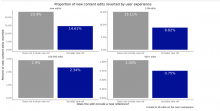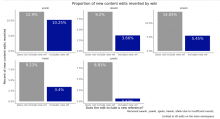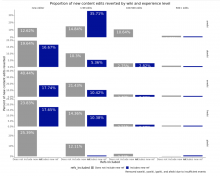With the ability to:
- Detect whether an edit involves someone adding a reference (T325713) and
- Detect whether an edit involves someone adding new information (T333714)
...we'd like to use this ticket to learn what proportion of edits that involve people adding new information also include them adding a reference.
Decision(s) to be made
Knowing the proportion of edits that involve people adding new information and a reference will enable the Editing Team to decide:
- What percentage change in the proportion of edits that involve people adding new information that also include a reference should we expect Edit Check to cause?
Research questions
- 1. What percentage of main namespace Wikipedia edits that involve people adding new information include a reference? How do these percentages vary by wiki, editor experience level, and editing interface?
- 2. What percentage of these edits are reverted? How does that compare to the revert rate of the new content edits that do not include a reference?





